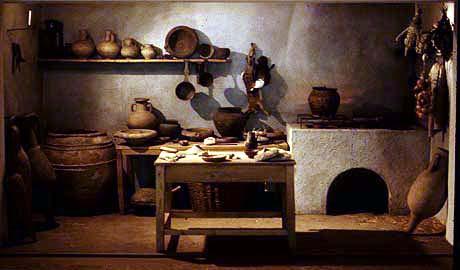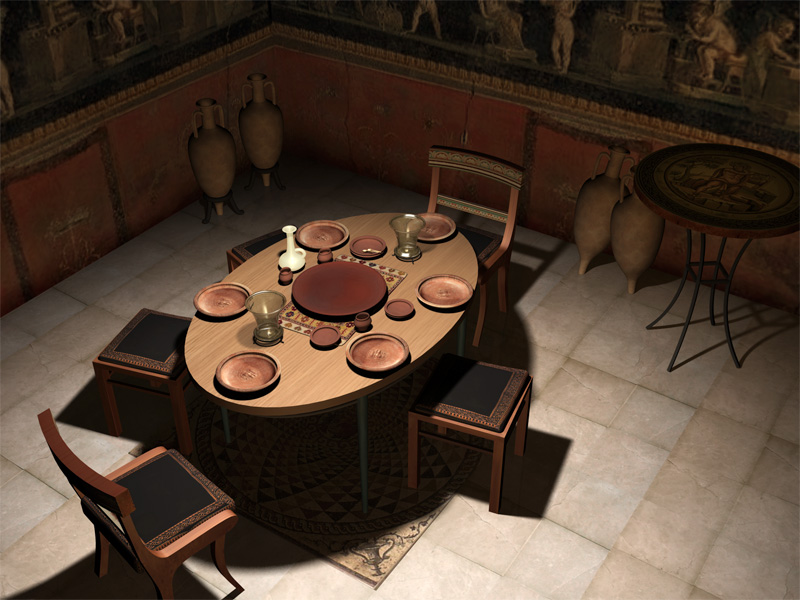
When you register you are randomly assigned to a house somewhere in the city. As you login and go through the game portal, you enter the atrium of you house. Click on an area of the picture to go to another room of your house.
Streets have names and houses have numbers, there are 50 houses per street. It is possible that you share your living accommodations with other players, but only one player can own a home. All player's homes have the same rooms, however the pergula is only of interest to the owner of the house.
Home

Each home has a number of rooms. The rooms are (in alphabetical order):
The alea are wings or corridors near the atrium. The alea are used for storage of goods, usually weapons and armor. This is the room where you equip your men who are in the army, cavalry, or navy.
The apotheca is a room in the top of the house. This is another room that was originally used for storage, often amphorae of wine and other items such as medicinal wares. In the apotheca you can see a survey of your family members, their health and sanitation.
The atrium or reception hall is the main room of the house. This is the room where you start, after you have logged in. From the atrium you can access other rooms, such as the triclinium and the tablinum.
You can also find your lararium (the family shrine of the household gods) in the atrium and see if you have received any blessings from the gods.
You can check the impluvium in the atrium and see what the current weather is like.
And last but not least you can check the arca (treasury strongbox) in the atrium and see how much money you have.
The cubiculum is the bedroom. Here you can see how much clothing and certain household wares you have. You can also clothe your characters in the cubiculum. Certain types of clothing are required for the characters to perform their jobs. A male farmer or shopkeeper for instance needs a tunic.

The culina is the kitchen, here you can cook meals for your family members. These meals can then be eaten at the triclinium.
The exedra is a room at the back of the house. Here guests can be entertained and private conversations can be held between the host (you) and the invited guests (other players invited to your home). The exedra is used to hold banquets and feasts dedicated to the gods. A feast can improve the favor and standing with a god or goddess.
The exedra also provides you with a short list of the available technologies to you. These technologies can be aquired with experience of a particular action. For example if you produce pottery then eventually you will be able to produce arrentine ware, which requires less clay.
Here is a list of the technologies and what they do:
The pergula is the office above the taberna or shop. In the pergula you can produce resources out of other resources and then sell these resources in the taberna.
The peristylium is the interior garden of the house. Here you can see if you have any villas in the provinces and you can also see how much land you have. The peristylium gives you a full overview of your agricultural production. In the peristylium you can select your peasants and have them cultivate farmland or pasture.
The taberna is the shop or workshop. In the taberna you can set how much resources you are willing to sell to potential customers and for what price. The taberna can be accessed by other players who are willing to buy goods from you.
The tablinum is the main office of your house. Here you can find many tables and events lists with information about your account and your characters or family members.

The triclinium is the dining room, where your family members can consume their meals and nourish them so their nutrition value goes up. The nutrition value of a character or family member can range between 0 and 100, where 100 is fully fed and 0 stands for starving. A character who hasn't received food and whose nutrition value is 0 before the season change will have his or health decreased. Once the health reaches 0, then the character will have starved to death, so try to avoid starvation whenever possible. Starvation also negatively influences the fatigue value of a character, which is yet another reason to avoid starvation.
The vestibulum is the main hallway which leads from the frontdoor to the atrium. The vestibulum is the other room that can be accessed by other players. In the vestibulum you and other players can see a small overview of data about you and your family. This is also the place where you can access the options or preferences and change things about your account. At the options or preferences you can turn on or turn off various things, such as: the music, the tutorial, the vacation mode, the quote of the day, etcetera.
Kitchen
The Culina or kitchen is the place where you can prepare meals. This room also shows you the resources that are required to produce a meal and how much you have in store of those resources.
See the paragraph on Consumption for more details.
Dining
Dining is the consumption of a meal by a character that is a part of your family at the triclinium. One meal is needed to get the nutrition value of a character back to 100.
Family
The characters that are a part of your family and over which you have inmediate control and who therefore can be used to produce goods, are: all your male family members, the wives of your male family members, the unmarried female family members, the slaves you own, your manumitted slaves, any adopted members.
Marriage
Consequences of Marriage
The wife in marriage goes to the husband's family. Any children from the marriage end up by the father. Any character who is already married cannot marry again for as long as the marriage exists. A marriage can be breached in two ways, (1) the husband or wife dies, or (2) the marriage ends up in divorce. The families of the husband and wife, cannot perform any hostile acts towards eeachother for as long as the marriage exists.
Marriage Requirements
The player who wishes to marry his male family member, to a female family member of another player, needs 2 pieces of jewelry to perform the wedding. Any jewelry that was used for the wedding is lost upon the signing of the marriage contract. Also the player who wishes who wishes to marry his male family member, to a female family member of another player, needs to propose and the other player to whom the proposal is send, needs to accept that proposal.
Marriages cannot exist between characters who already related. That is: (1) characters of the same gens, (2) characters who share the same father, or mother, or grandfather, or grandmother.
Divorce
A marriage can be annulled by divorce. The children stay with the family of the husband after the divorce, while the wife returns to her original family.
Births
Each year there is a chance that a married female character may give birth to a child.
Deaths
Each year there is a chance that a character may die due to a non-event related death, such as old age or disease.
Adoption
It is possible under some circumstancs for a family to adopt a man into the family (for example when there are no more male family members), to keep the family line from getting extinct. This adoptee can be a manumitted slave, or a male character from another family. Keep in mind that adoption does affect the marriage ability.